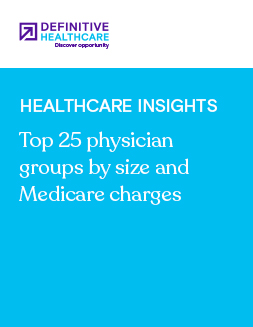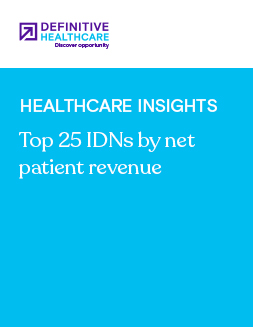Healthcare Insights
Top prescriptions by cardiologists
It’s estimated that nearly half of all adults in the U.S. have some form of cardiovascular disease (CVD). The high prevalence and devastating impact of CVD have led many life sciences companies to develop pharmaceutical agents for cardiac conditions. These life-saving therapies help treat cardiac symptoms and can greatly improve the quality of life and health outcomes for those living with CVD.
Definitive Healthcare tracks more than 3,800 cardiovascular drugs as of March 2024. Below, we rank the top 10 cardiovascular drugs by share of total cardiologist prescriptions.
| Rank | Drug name | % of total prescriptions | Explore dataset |
|---|---|---|---|
| 1 | Metoprolol succinate | 8.50% | Explore |
| 2 | Atorvastatin Calcium | 7.80% | Explore |
| 3 | ELIQUIS | 5.20% | Explore |
| 4 | Amlodipine Besylate | 4.90% | Explore |
| 5 | Carvedilol | 4.40% | Explore |
| 6 | Rosuvastatin Calcium | 4.30% | Explore |
| 7 | Losartan Potassium | 3.80% | Explore |
| 8 | Lisinopril | 3.70% | Explore |
| 9 | METOPROLOL TARTRATE | 3.20% | Explore |
| 10 | Furosemide | 3.20% | Explore |
Fig. 1 Data from our Atlas All-Payor Prescription Claims product. Claims data is sourced from multiple medical claims clearinghouses in the United States and updated monthly. Data accessed March 2024.
What are the most prescribed cardiovascular medications?
Metoprolol succinate is the most prescribed cardiovascular medication, representing 8.5% of total cardiologist prescriptions in 2023. This drug is a beta blocker that can treat chest pain, heart failure, and hypertension by lowering blood pressure.
Second on our list for top cardiovascular agents by total cardiologist prescriptions is atorvastatin calcium, a cholesterol-lowering agent commonly sold as Lipitor, with 7.8% of prescriptions. Eliquis, the brand-name version of apixaban, comes in third with 5.2% of prescriptions.
Many of the drugs on the list help reduce cholesterol levels or blood pressure. Around 38% of adults in the U.S. have elevated cholesterol levels, and 47% of adults have hypertension.
What is cardiovascular disease?
Cardiovascular disease refers to several conditions commonly diagnosed by cardiologists, including:
- Heart attacks
- Heart failure
- Stroke
- Heart valve problems
- Arrhythmia
- Heart disease
CVD can present with a wide range of symptoms across the body, including chest pain, numbness, shortness of breath, and jaw pain.
Cardiologists and other healthcare providers usually treat cardiovascular disease with a combination of prescription medications, surgery, and medical devices like pacemakers. Lifestyle changes related to diet, exercise, sleep, and stress may also support the management of CVD.
How do cardiovascular drugs help cardiac conditions?
Cardiovascular agents can help individuals experiencing cardiac events recover. They can also help improve or manage symptoms and prevent the reoccurrence of stroke, heart failure, or heart attack.
There are many types of heart medications. Some of the most common drugs prevent and treat prevalent cardiovascular issues like blood clots, high cholesterol, high blood pressure, and arrhythmias. Healthcare providers consider many factors like age, diagnosis, and lifestyle when prescribing medications.
What is a cardiologist?
A cardiologist is a physician who prevents, diagnoses, and treats issues related to the heart. To become cardiologists, physicians complete specialized training on the cardiovascular system.
Learn more
Healthcare Insights are developed with healthcare commercial intelligence from the Definitive Healthcare platform. Want even more insights? Start a free trial now and get access to the latest healthcare commercial intelligence on hospitals, physicians, and other healthcare providers.


